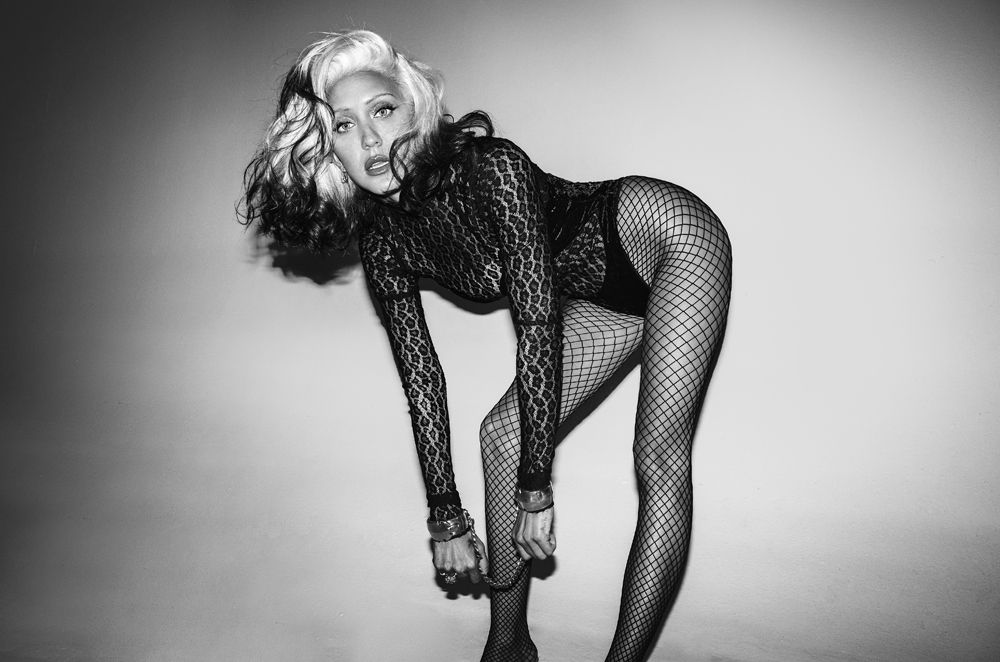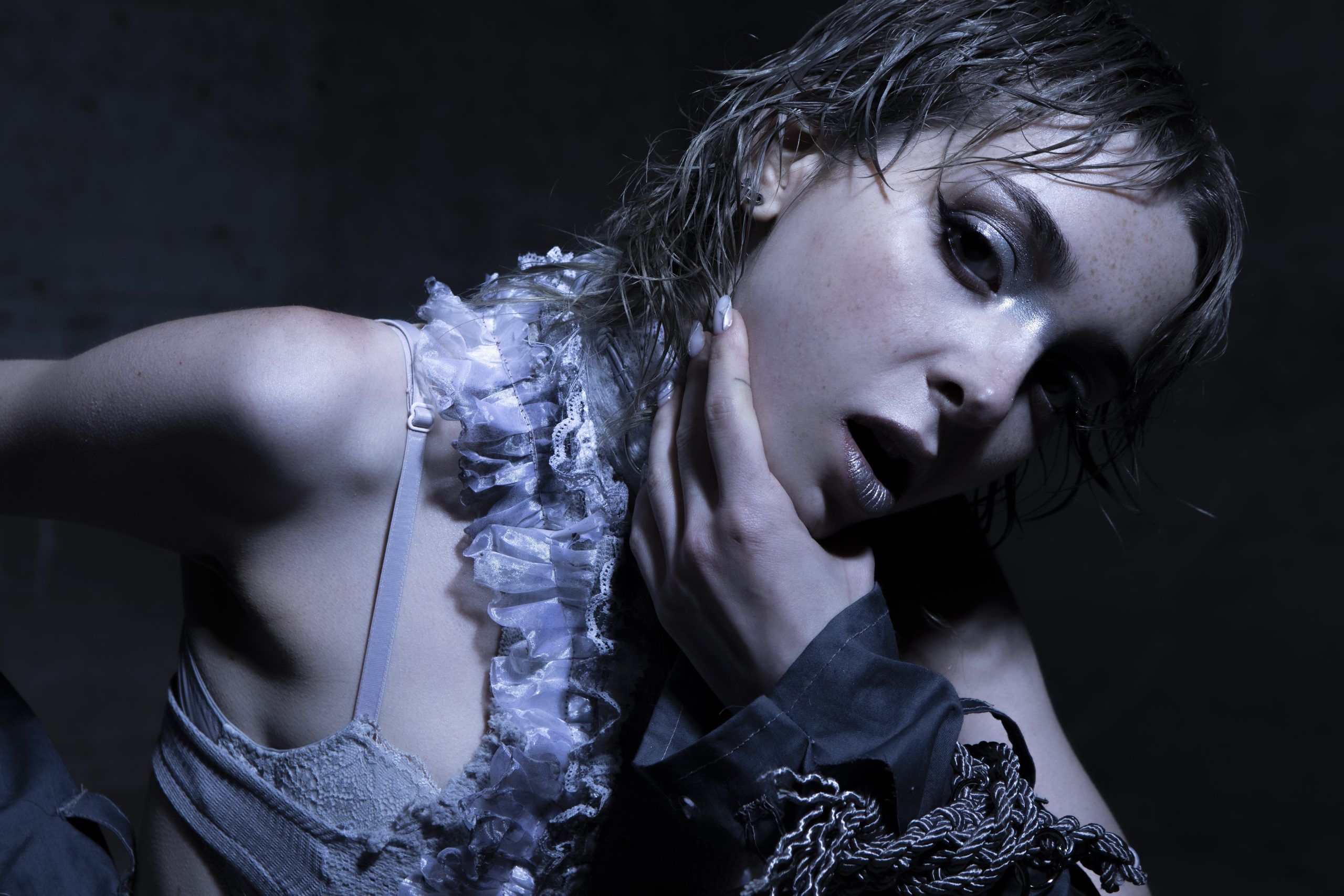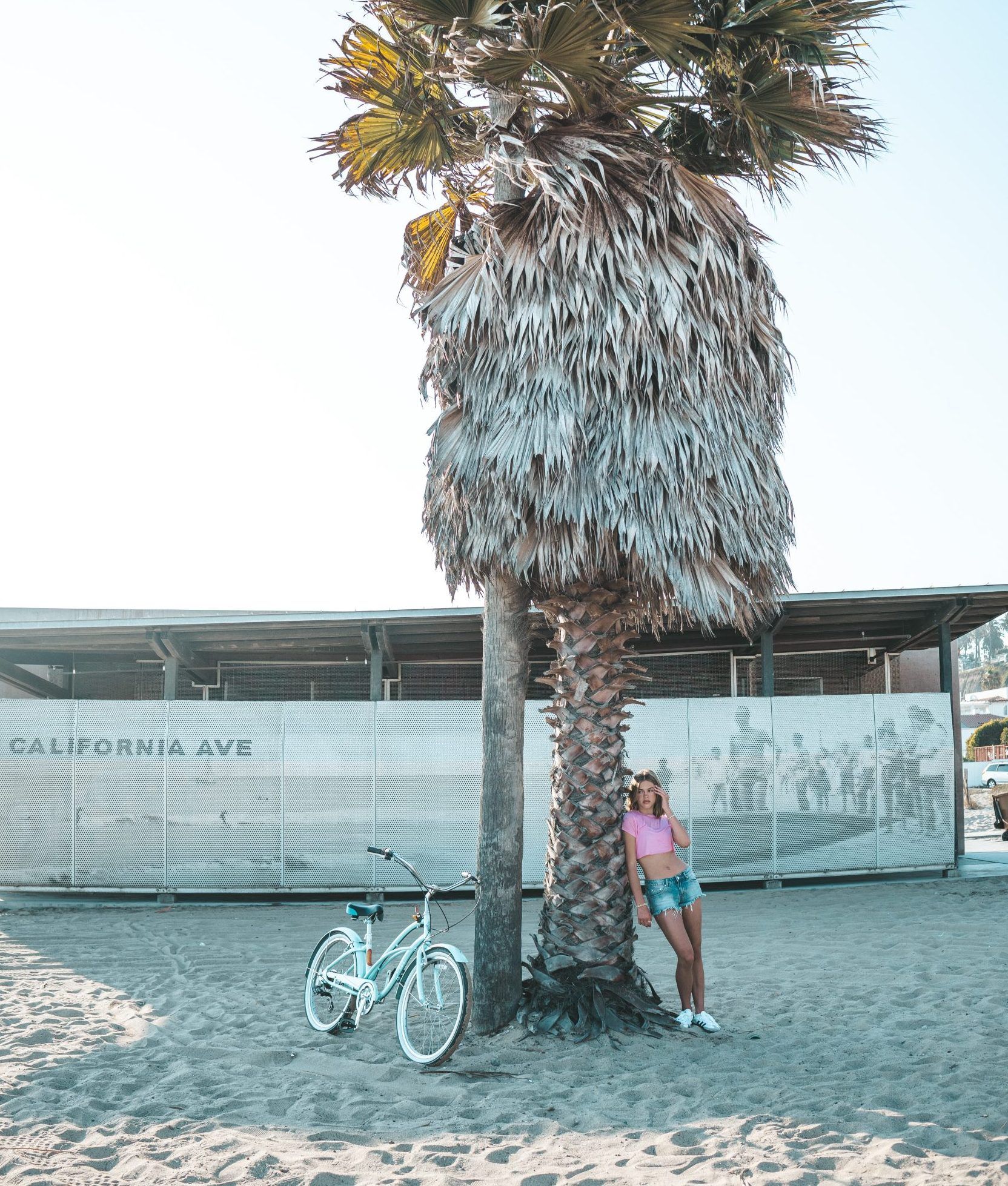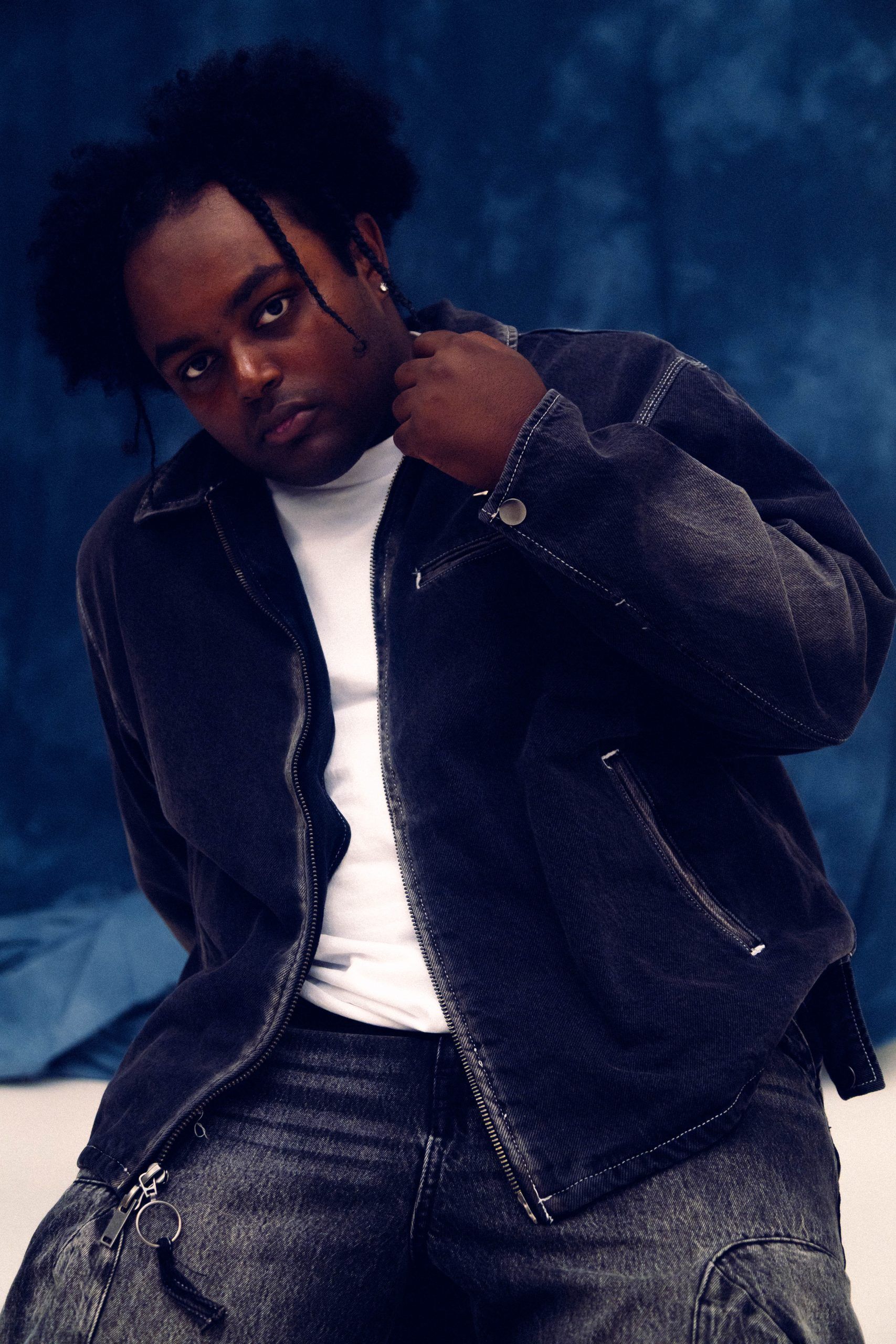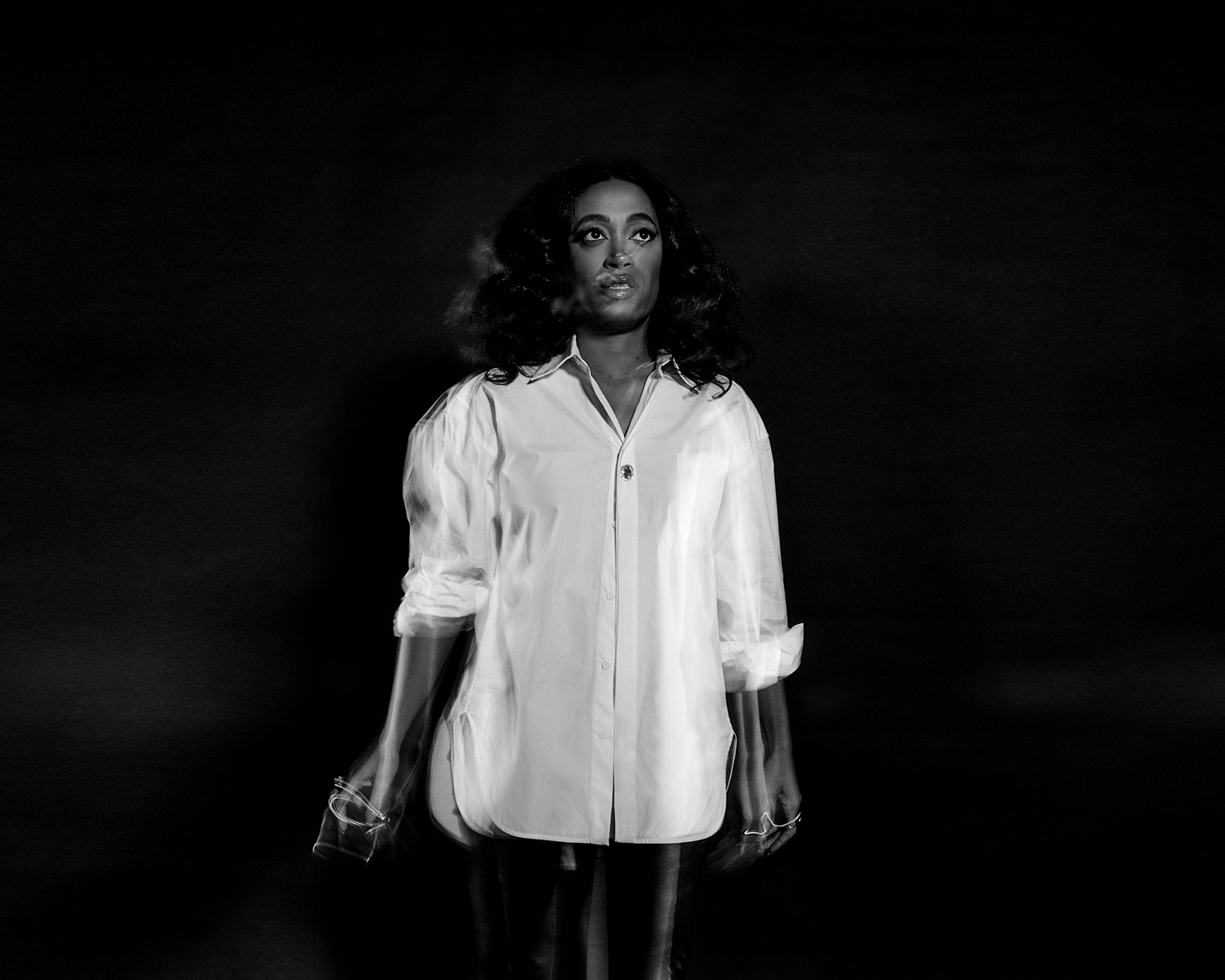Jesse Jo Stark’s new album Doomed is the perfect soundtrack to a Western horror—necessitating a genre of its own making as the record is a unique exploration into the unknown.
Jesse Jo Stark’s new album Doomed is an irresistible plunge into the inner workings of her creative mind. As a perfectionist, she spent countless hours crafting this collection of songs to create an eclectic blend of artistry. As she explained during our conversation, the tracklist was carefully curated and arranged. By playing the record in order, listeners are taken on a voyage of discovery that mirrors the one Stark undertook in the process of creating her music. Over the last few years, she’s tapped into her femininity, her womanhood, and her power. She also explained how the process of creating Doomed allowed her to reconnect with her inner child in a way that felt authentic and necessary.
Stark recalled how she watched home videos of herself when she was younger as she worked through the tracks on her album. Some songs were born from earlier poetry, whereas others were written specifically with Doomed in mind. She ultimately settled on 11 songs that she felt told the right story in the right way. For someone who’s meticulously detailed about everything she does—from her music to her designs for Deadly Doll and Chrome Hearts, and everything in between—the devil was really in the details for Stark as she worked on Doomed. The title of the record also holds specific meaning for her, as she wanted to show that there’s more to the word than typically meets the eye.
When listening to Doomed (and watching the accompanying music videos, which are a masterclass in artistic vision and passion) it’s clear that Stark poured her heart and soul into this album. Every song becomes your favorite song as soon as you finish listening to it, and you have to work your way back to the beginning to determine which one really reaches inside you and pulls something out that you forgot was there. It’s this element of connection that means the most to Stark as a musician, and it’s something she accomplishes on Doomed with both grace and ease.
In conversation with 1883 Magazine, Jesse Jo Stark discussed the process of writing and arranging songs for Doomed, the importance of connecting with herself on a spiritual level, what it was like growing up in a creative environment, and one of the most important lessons she learned through observing her godmother, Cher.
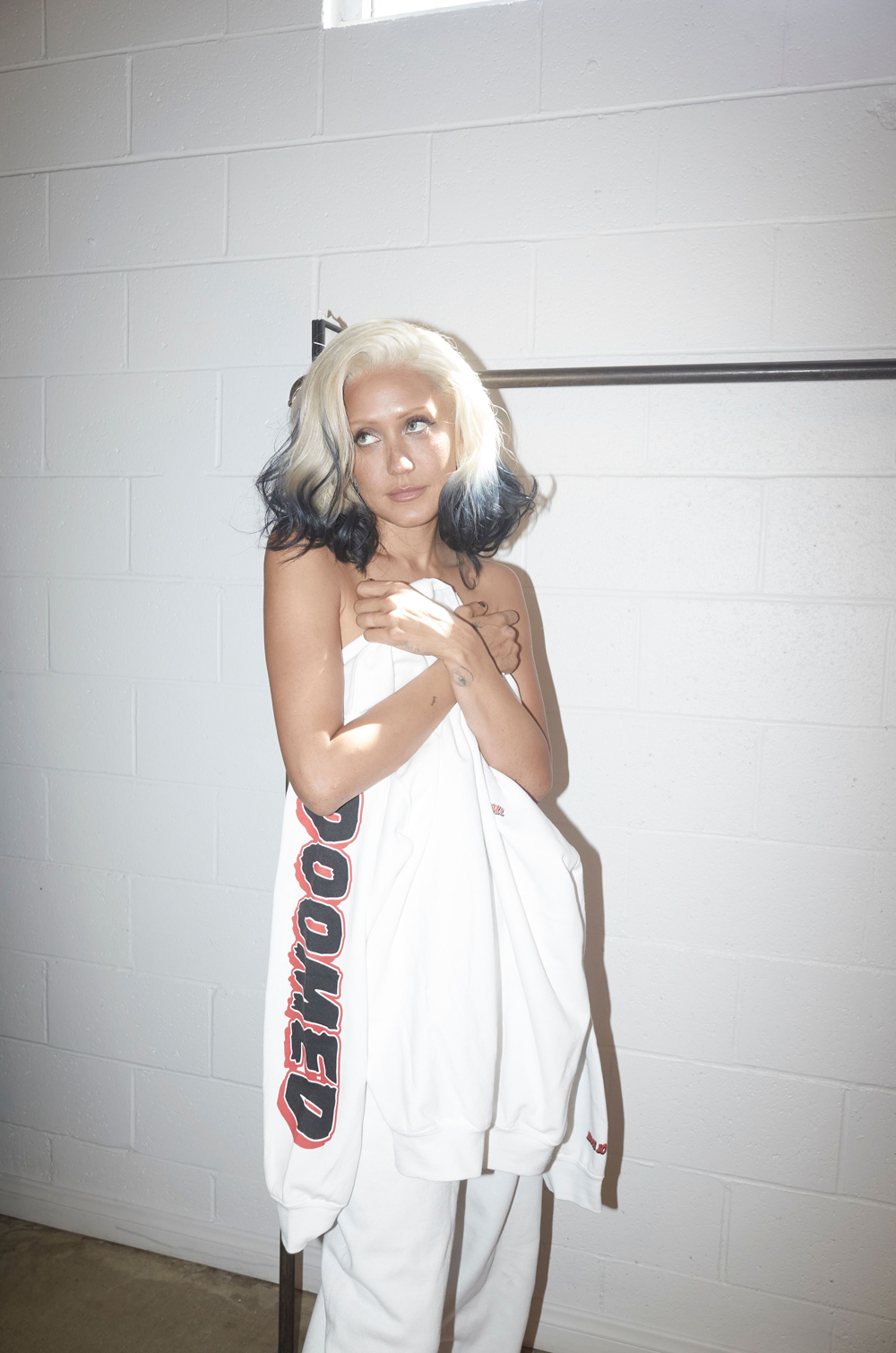
I listened to the interview that you did for Jonesy’s Jukebox, and you said something that I thought was super interesting where you were talking about being a late bloomer and how you feel you enjoy your life in different ways now because of this. I was wondering, how has being a late bloomer helped you in terms of creating your new album Doomed?
I think just approaching this one in a different way emotionally. I feel like I left fear out of the equation a bit more, but I also invited it in in other ways. I truly believe I’ve never been more in my body. I’ve really been in touch with my femininity and my womanhood. And I think it’s empowered me and it allowed me to encapsulate this strong narrative of what I really want to say. I don’t think my music has changed, but it feels a bit more mature for me, and I went about it with less judgment and just had a really good time. And I think that adds to the songs and the different sounds that you’re hearing on the record.
I think that, even just from the singles you’ve released, you can see that throughline that has always been in your music, but there’s also an elevated level of authenticity in the album that seems like it’s stemming from that elevated authenticity you’re feeling in your personal life.
Yes, exactly. That’s exactly it.
I also read that you write poetry a lot and that you often turn your poems into lyrics and create songs from there. For Doomed, were a lot of the songs born from these earlier writing projects? Or did you have a blend between older lyrics and newer ones you created specifically for the album?
Some of these songs were already written and then we completely rewrote them. I spent so much time really perfecting what I wanted to say…not necessarily perfecting, but making sure it’s what I really wanted to say. And so, one song is six years old, one song is three years old, it’s something I wrote before the pandemic. And I looked at it and said, “How can we elevate this?” And really, I wanted to be less cryptic and more upfront about what I was trying to say. So, it’s definitely a mixture of both.
I’m always intrigued by how people put albums together because I’m not musically creative. How do you know when you’re going through this process of listening to all of these songs what you want on the album versus what might work better for a later release?
You know, it’s interesting. I was going to release 13 songs and we nicked two because we don’t want to push it. And even though I want all my babies to be a part of one project, you have to leave some behind sadly. And I wanted to kind of feed myself in these different moods. I wanted to have one that you could dance to one, you could cry to, one you could sleep to, one you could be off to. I organized them in that fashion where I was like, “Okay, are these feeding my hunger?” And eventually, they all did. And that’s when I felt like I was ready. I spent a long time on the track listing and the order of all of that. And so, I don’t know, I think it’s so intimidating to put a project together like this, and I’m a procrastinator. I never did well in school. I always waited until the last minute. And with these songs, they really came together in a specific way. And then along with the album name. And you look at your crew of people and you just go, “Oh, we made a decision.” And you hear it, and you just know. It’s a feeling, it’s quite organic. I didn’t want to push anything or try too hard. I went with my gut. I really listened to my gut.
I think that’s important in everything in life. I always say that I listen to my gut above everything else. It doesn’t matter what anyone is cautioning me or advising me to do. If my gut is telling me this is right or this is wrong, that’s what I listen to.
It’s so interesting. If you really listen to your body, it’s so powerful. I always joke that I want to be a superhero, but I think individuality is a superpower. When I really, really separate my mind and my heart and my gut, which is so hard to do, you arrive at this answer for yourself that you didn’t really need to involve everyone else with. You just have to really ground yourself and you’ll know.
I think it also helps that you, as you were saying earlier, almost feel more yourself now than you did before. When I turned 30, I transitioned into this new sense of intuition that I didn’t have in my 20s. I feel more attuned and grounded in myself to say, “This is the decision that I’m making. This is what feels right.” Especially if you can, as you’re saying, get your head and your body and your heart to agree on something, especially something like this, where it’s such a passion project and you want to make sure it’s a good representation of who you are and where you’re at right now. That’s powerful.
Yeah, and I think as long as you know it’s right…I was going to go on a whole spiritual journey, but I won’t bore you with it. [Laughs].
Please feel free! I am always trying to be more spiritual and honest and open. I’m very into intuition and understanding yourself and honoring your emotions.
Yeah, totally. Honoring your emotions—that’s beautiful.
Oh, thank you. I always say that. I think if you fight against whatever it is you’re feeling at the moment, it inevitably makes it worse. Whereas if you honor it, you sit in it, you let it wash over you—it’s more productive, I think.
Totally. I think that’s what separates us, too. And that’s what you can add to your art. It’s your individuality and your pure honesty. That’s what separates not bad art and good art, but what’s powerful about some art and what’s not. People are really receptive to the truth. That’s important. And it’s important to just be yourself in what you do. I’d like to think that’s why people respond to my art and my music because I kind of reject anything that’s not real. I guess that’s what I have to offer.
One of the many things I have always loved about your music is that level of authenticity and vulnerability and honesty, not just with the lyrics, but how you present everything visually and artistically. There are so many lines I could pull and be like, I have felt this and experienced this. And if it resonates with even one person, that’s all any of us can ever hope to do with our art.
I know, it’s crazy! But I love it. I love it.
Are there maybe specific emotions you’re sharing on Doomed for the first time that you’re nervous to have released into the world? Or do you feel like it’s going to be cathartic for you once it’s out there fully?
I think it’s cathartic in a way when I get to play these songs live and really be inside the words. I was a bit nervous about some of them. When I wrote a couple of these with Jesse and Thomas [Hunter], but Jesse was kind of the one who pulled things out of me. We spoke as friends and he pulled things out of me that I wouldn’t normally say about myself and I was giddy about it. I was kind of like, “Am I really going to say that to the world?” I’m an overthinker and it’s not that I think about what I’m going to say because I always say what I want to say, but with my music, I’m usually more cryptic. And there’s a vulnerability to the lyrics on this album that is different to me. So, I don’t think I’m nervous. I think I’m almost excited to own my power and own this character and own myself, and tell this story. That’s why the track listing is so important because I feel that there’s a strong narrative to it. Doomed has this positive ending and not a negative one because that word [doomed] has this strong feeling attached to it, but it’s really not supposed to represent that.
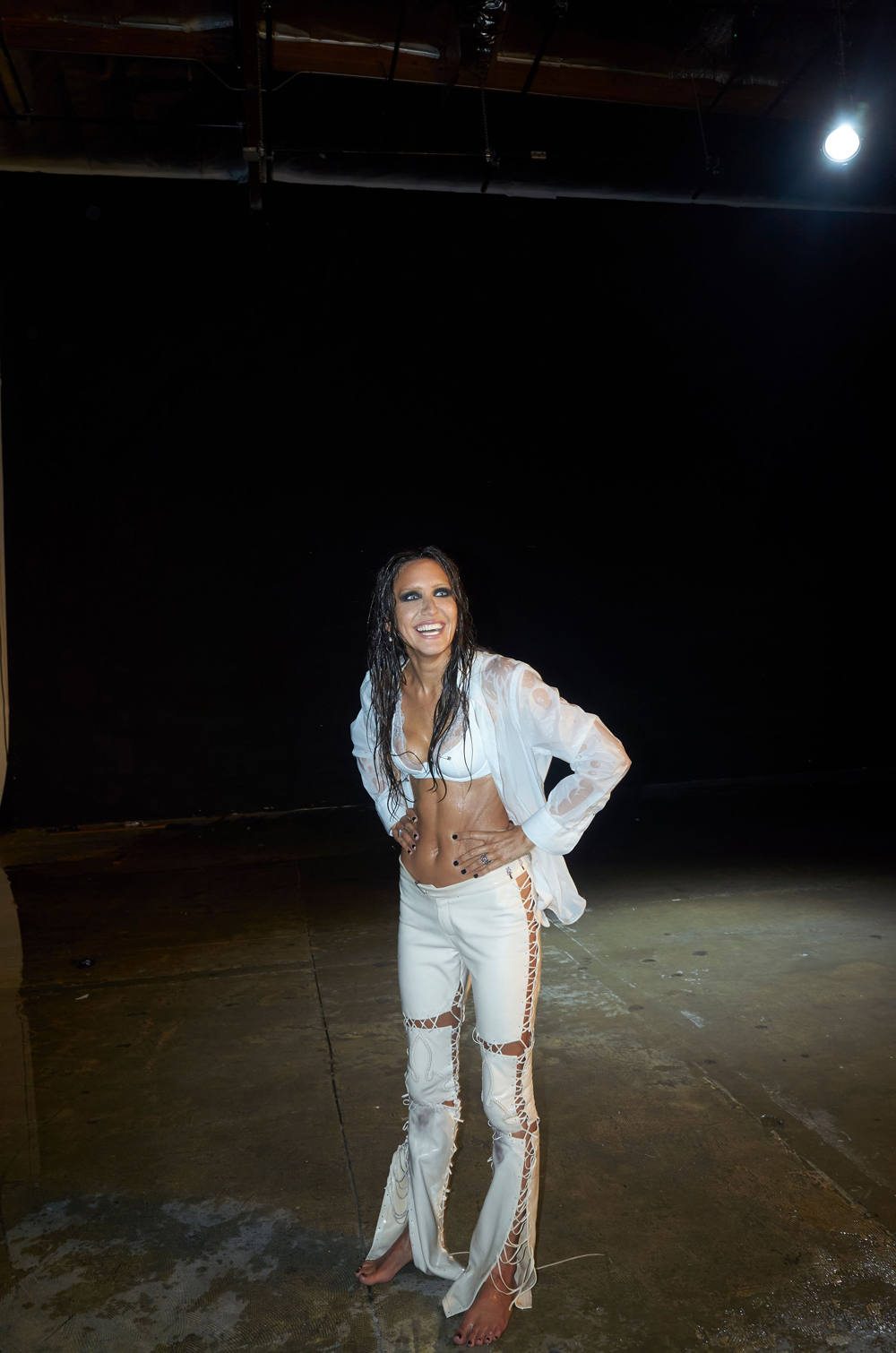
I think that there’s always this interesting duality to words where people take them at their regular face value, but there are so many other things you can read into and take from them. Speaking of these creative places you often find yourself in as you make music, you grew up in an incredibly artistic environment, not just through observing your parents’ creative endeavors, but through the people you were surrounded by during your childhood as well. How did that exposure to an elevated level of creativity from such a young age influence you, particularly in terms of your music?
I always wanted to fight and stand on my own two feet and really understand myself as an artist separate from my family or my idols or the people I grew up around. I grew up around a lot of adults and a lot of artists that were really struggling at the time. They were building this life for themselves. So, I was on the come up with my family and I saw them work so hard and never make excuses. And I think that’s something I learned from my parents. It wasn’t easy for any of them, but it was very cool. I knew I wanted to be on stage. I knew I wanted to make a specific bag, or try this or try that. And it was so inspiring to be able to do that, but music felt more like it was mine. And in a different way. It completely influenced me. I don’t know how it couldn’t. Anything from my dad playing all types of music on the way to school to letting me make my first little leather bag that I stapled together and glued with my best friend. Being around people that knew what they wanted was intimidating, but really, really inspiring. And I think the people that you’re around when you’re young make you who you are. So luckily, I was around some cool people. And here I am. [Laughs].
And it’s really great that they encouraged all of your creativity in whatever way it presented itself and let you flourish in that independently.
One thing I love about my family is they really embrace the youth and they embrace change. And I think as we get older, we get stuck with our ideas. And I think that’s something that’s really wrong with the world. But that’s something that is inspiring about my parents—they always embrace the youth. My brother and sister are 19, and we always see how they’re feeling and what they’re up to and what they think about things and how they do things. And it’s always different. That’s what’s really cool about how art reinvents itself.
I love that they’re tuned into what the younger generation is doing. Because I feel like they’re often the group that is most overlooked and not taken seriously, but they’re the future of everything. They’re seeing things and observing things and feeling them in ways that are entirely unique and different from how everyone else is perceiving the world.
And it’s so crazy because on this album, I watched a lot of home videos of myself because I feel like we’re very hard on ourselves, you know? There are a lot of expectations when you’re young, but you’re not living in fear. You don’t have to, there’s no fear involved, you jump off the cliff, you’re fine. You get a bandaid, you’re good to go do it again. And then as you get older, all of a sudden, you don’t want to ride the same roller coaster. So, I checked in with the little girl a lot and just reminded myself to not be so hard on her. You can hear me speaking at the end of my song Slayer and I think that there’s something beautiful surrounding that. It’s just reconnecting with yourself as a child because, kids almost should be taken more seriously because they speak nothing but the truth.They’re so literal and they’re so real. And then we get jaded as we get older and all these things start to stick to us. So, the theme on this album is also a take on having this relationship with myself as a little girl.
I think that’s so important. I sometimes feel like I’m perceived by others as having this weird, childlike wonder for the world. But I feel like, because I was mature from a very early age, I missed those childhood experiences. So, it’s important to honor that and experience that even into adulthood where you can say, “I’m going to be honest, I’m going to enjoy things completely, I’m going to be full of wonder, even if it’s easier to be stagnant.”
Totally. People that are weirded out by that just aren’t enjoying themselves as much. Do you know what I mean?
Yes, absolutely. I always try to feel like that, too. Do you do something every day to reconnect with your inner child? Or is it something you were doing for the album specifically?
I try. I think it comes naturally to me. I always have candy in my bag. [Both laugh]. I always have puppets. I have finger puppets! I’m a trip, I’m in my own world. I think my friends at this point, get it. My boyfriend sometimes is like, “What are you doing with the 25 finger puppets in your bag?” [Both laugh]. And I’m just like, “Let me know when you need one because you’re going to need one.” And then almost everyone always wants one of my candies or wants to do the little fidget thing I have. Everyone wants to partake. For me, it just comes naturally. I always try to put my feet in the grass and I always try to connect with nature. With the internet and everything involved, you have to focus your energy on other things. So, it wouldn’t be specific to the album. I think watching home videos and all of that I don’t do regularly. I called upon that specifically for Doomed, but every day I always try to stay in my weird little bubble.
I’m also a space cadet. I’m just out here existing in my little world. In terms of Doomed, you have a very distinctive, clear sound in your music and it seems like it has always been noticeable in everything you’ve produced but has become more focused over time. When you first started making music, did you know that was the vibe you were going for? Or was it a trial and error process to figure it out?
When I was younger, I recorded covers. I was really frightened by my own poetry and didn’t think it was good enough. And I recorded a lot of covers. I recorded Merle Haggard and The Pretenders cover. I did all these different types of things and I didn’t know what I wanted to sound like. I’d written my own songs that I recorded eventually, and I think I always arrived at the same place. I love country music and I love The Cramps. I love punk, I love country. And so, I’ve always wanted to have this…I used to call my music horrific hillbilly, because I just couldn’t pick a lane, and everyone was like, “What genre are you in? You’re not going to have a career because you don’t know your genre.” And I was like “Well, I’m horrific hillbilly, nice to meet you.” [Both laugh]. And now, the more people hear the album, the more people say fun things like goth disco or Western dance, and it’s always fallen into this specific lane. I think with Doomed, it’s been more elevated than it ever has been and more concentrated. So, it’s kind of cool. But I didn’t intend to sound like one thing. I just know what I like to hear.
Yeah, absolutely. It feels like through your whole entire body of music, but particularly with the singles you’ve released so far for Doomed, you can see the clear distinction between these influences. And I think it’s incredible because nobody is ever just one thing. Some days you feel more punk or you feel grungey or you feel girly or whatever. It’s nice to have music that suits all of that in one album.
I know, sometimes I’m like, “Why do I look so different than I did yesterday?” But I’m still the same person, I just want to be comfy today. And then tomorrow I’m going to be in stripper heels. It’s not a big deal, you know?
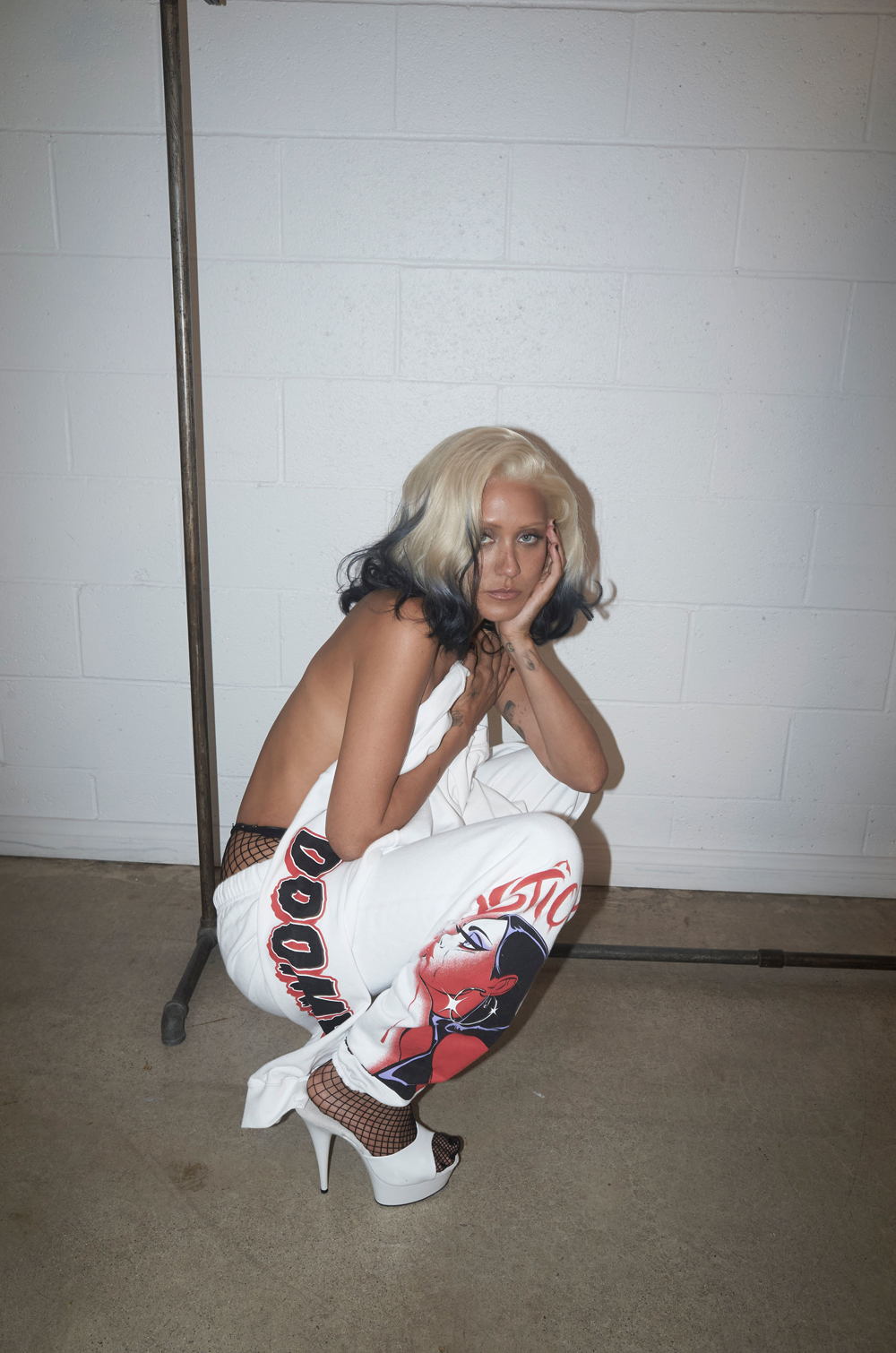
I do that all the time! [Both laugh.] I feel very feminine and girly and I want to wear a dress one day. And then the next day I’m like, I have to wear pants today.
“How did I wear a skirt yesterday? I have no idea.” Exactly, yes!
Speaking of clothing, in addition to self-producing your music and working within the music industry, you’re constantly working on all these other creative projects as well, like your clothing line Deadly Doll, and working on Chrome Hearts with your parents. But, I had read before that you describe yourself as a perfectionist. So, is there one creative area that feels most freeing to you?
Most freeing? I would say, if I’m playing, if I’m on stage, that’s the freest I can be. But I would say that I’m harder on myself with my poetry and easier with design. But I’m a detail freak, and my dad always taught me to pay attention to every detail. I’m free when the job is done or the project is done. I don’t think it’s an easy process for me.
It is tough when you’re a perfectionist and you’re trained on all the little details. I do often think that once it’s done, that’s when you can celebrate and enjoy it and feel free by the release of it versus the experience of the actual creative process.
I think with design, I’m creating for someone else. With music, I would say selfishly, it’s more like I have myself in mind. Once it’s done, it’s for the world and it belongs to the world, but in the process of making it, it’s really stemming from my heart. With design, it’s more of an outside muse and I’m creating it for others. So, it’s less intense.
I’m sure it’s nerve-wracking in a way because it’s all being consumed. And it’s still a part of you, regardless of if it’s this song that you created or something that you designed that’s being released into the world—it is this creative part of you that’s going to be consumed by others.
I think the connection is so cool. Still, to this day, when I see someone wearing something I designed, I’m like, “What the hell? I can’t believe you’re wearing that!” And then if someone comes up to me, like this girl came up to me last night and was like, “I’m such a huge fan of yours, I love your music so much.” And I immediately wanted to know what her favorite song of mine was, I wanted to know everything. It’s so cool to connect with people without even realizing you’re doing it. That’s the only thing I like about the internet is that you can meet people and see people and what they have to offer in a different way than you ever could otherwise.
I definitely agree with that. I am begrudgingly on the internet. I like the connective aspect of it as well, but otherwise, I find it’s very tiresome to be existing in a world where you’re constantly expected to be on. You’re constantly expected to be responding. I think that it’s contrary to human nature in a lot of ways. You had also mentioned in a previous interview that you had wanted to be a singer since you were young, and you’ve been watching this dream bloom more and more with each new release. What’s been the most rewarding part of that experience for you?
That’s something I’ve figured out as I’ve grown into myself and my process. The idea of saying, “I want to be a singer” is so interesting because I have been a singer this whole time, but I never thought I was, or you never think you are, but you are because you’re experiencing, and you’re making art, there’s no end goal. If I get to play the rest of my life or I get to write, all those little things are a luxury to me. I think it’s just the simplicity of doing and being what you want and who you are—that’s the most beneficial part. When I get to walk on stage, I put my little boots on and I’m half naked and I get to sing and I get to look in people’s eyes and they know my words, that’s killer. There’s no other feeling like it. But then when you get off the stage, it’s over. You have to really enjoy the process and never forget that that’s part of living. I mean, that’s life, right?
Yeah, absolutely. And it is those everyday moments that have to be as significant as the big moments for you to feel like it’s all worthwhile. It’s worth your time. It’s worth your effort. It’s worth your passion. I think even something as simple as speaking it into existence and saying, “I am a singer” makes you one. And I think people don’t always grasp that, which is unfortunate.
And you know when you have a dream and nobody really wants to hear about your dream the night before? And you’re like, “I had the craziest dream!” and your friends are like, “Why do I have to listen to this dream?” Because they weren’t there. But when you create, when you’re in this world, whether you’re a cook or you’re a singer or an actress or whatever, when you have people around you that you’re creating with and sharing that feeling with, I think that’s super, super beneficial. Because they’re equally as excited about what you’re doing. So that’s what was cool about making this record with my friends—the four guys and whoever else was involved—just being able to sit in a room and listen to the songs with them, that’s the coolest feeling. Because you’re looking at each other and you’re just like, “We did that.” And that’s really exciting.
That must be such an incredible collaborative moment. When you said that about your dreams, it reminded me of this quote from Joan Didion where she said, “The writer is always tricking the reader into listening to the dream.”
Love! I love that.
That is exactly what you’re doing as a creative person. You are tricking everyone into listening to your dreams even when they don’t want to. I had read as well that Cher is your Godmother, which you have mentioned in numerous interviews, but I was interested in talking about whether you felt like there was a specific lesson you learned through observing her that you’ve carried into your own music career?
She always told me to be myself. I know that sounds so cliché, but when she says it, it’s because there’s only one you. And I always kept that close to my heart. I really love how she is and who she is. She’s such a woman, but there’s this masculinity to her as well. And she’s just so herself. And I think the industry is so intimidated by someone like that. And I think that translates to me because I’ve always watched her literally work her ass off, but she’s so sweet. And I think that goes a long way. That always stuck with me.
And I feel like being kind is always difficult to do, especially when you’re in an industry that doesn’t necessarily reward people for kindness. I think if you can maintain kindness and sweetness that says a lot about you and how you’re approaching your work.
Totally. Yeah, exactly.
I like to end my interviews with one fun question. So! I know how much you love your dog, Billie.
Oh my God! Billie!
I wanted to give Billie a shout-out because I’m such a huge dog person. So, if you had to pick one famous musician who reminds you most of Billie, who would you pick and why?
Oh God, that’s such a fun question! Wait, let me break this down real quick. You shouldn’t have asked me this. [Both laugh]. We’re going to be here for 20 minutes. She doesn’t like other animals. She doesn’t do well with others. She’s a diva. Who does that? I mean, besides being just me. [Both laugh]. Oh my God! I don’t know. I’m stressed.
I always do this and I always ask it at the end. And everyone’s always like, “This is the hardest question to answer!” And I wonder if I should ask them at the beginning instead and then give people the entire time to think about the answer. [Both laugh].
I think you need to! But then the whole time we’re going to be thinking of that and being like, “I can’t wait for that question.” Who are artists? I don’t even know. [Both laugh]. I can’t even think of anybody. Can I say Frankenstein? Or does it have to be a musician?
It can totally be any famous person you think best represents her! Frankenstein’s great. I love Frankenstein. Are you thinking about just Frankenstein or the Bride of Frankenstein, too?
I’m just thinking of Frankenstein. Because black and white film, doesn’t play well with others. She’s definitely not Elvis.
She’s more of a recluse. She’s a Boo Radley who wants to be in the house. You just leave her little things outside for her to come and grab later.
Billie’s very social with humans but she doesn’t like animals. Honestly, I can’t answer the question. [Both laugh]. She’s me. Except she likes to talk to people more and I’m a little bit more like, “What do you need from me? I don’t know if I’m going to like you yet.” That’s my vibe.
I’m also very hesitant. My best friend and I always refer to ourselves as indoor cats. We’re like, I don’t know how I feel about this. You can make your offering and I’ll get back to you.
[Laughs]. I love that!
Doomed is out now, follow Jesse via @jessejostark
Words by Sam Cohen

